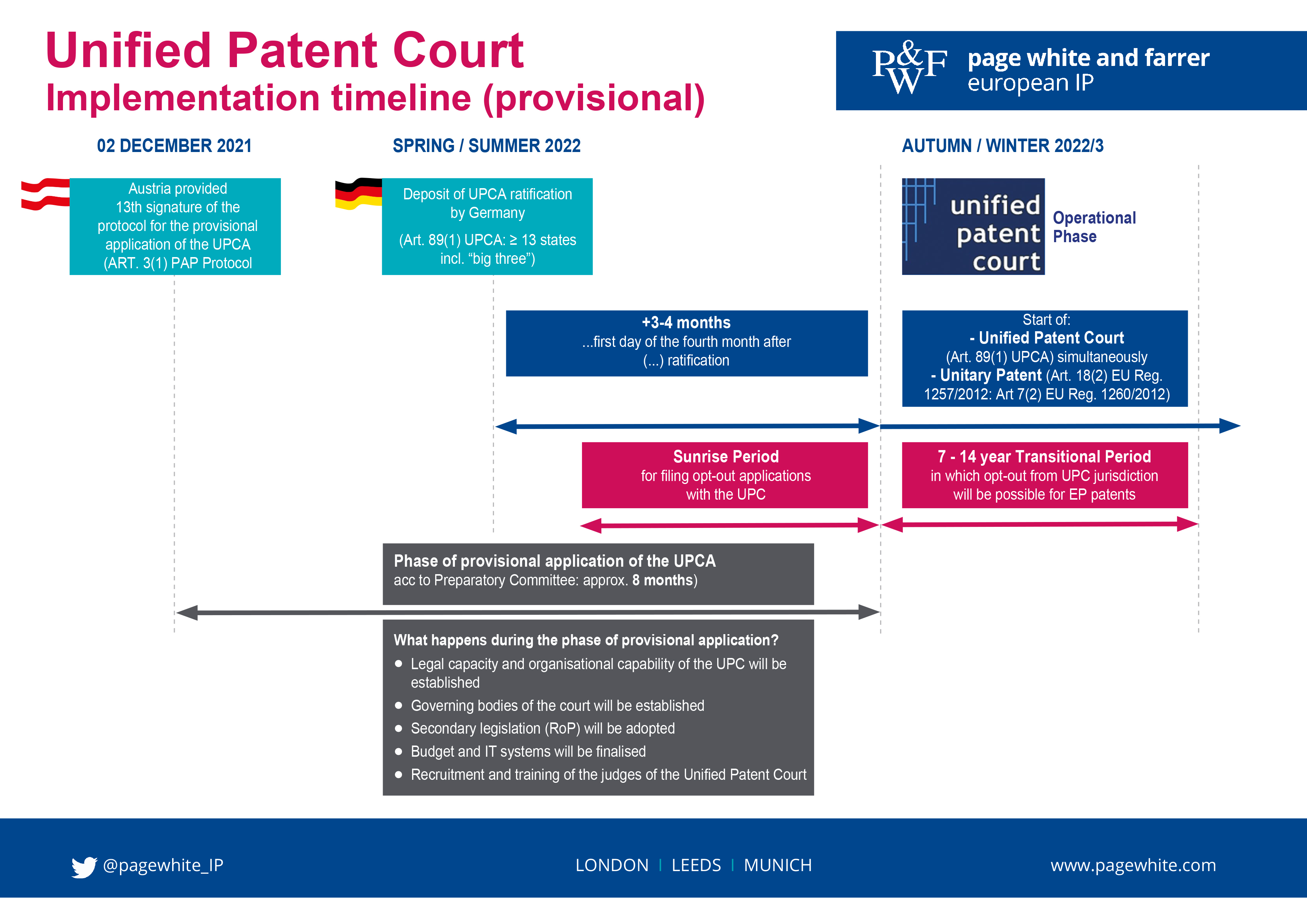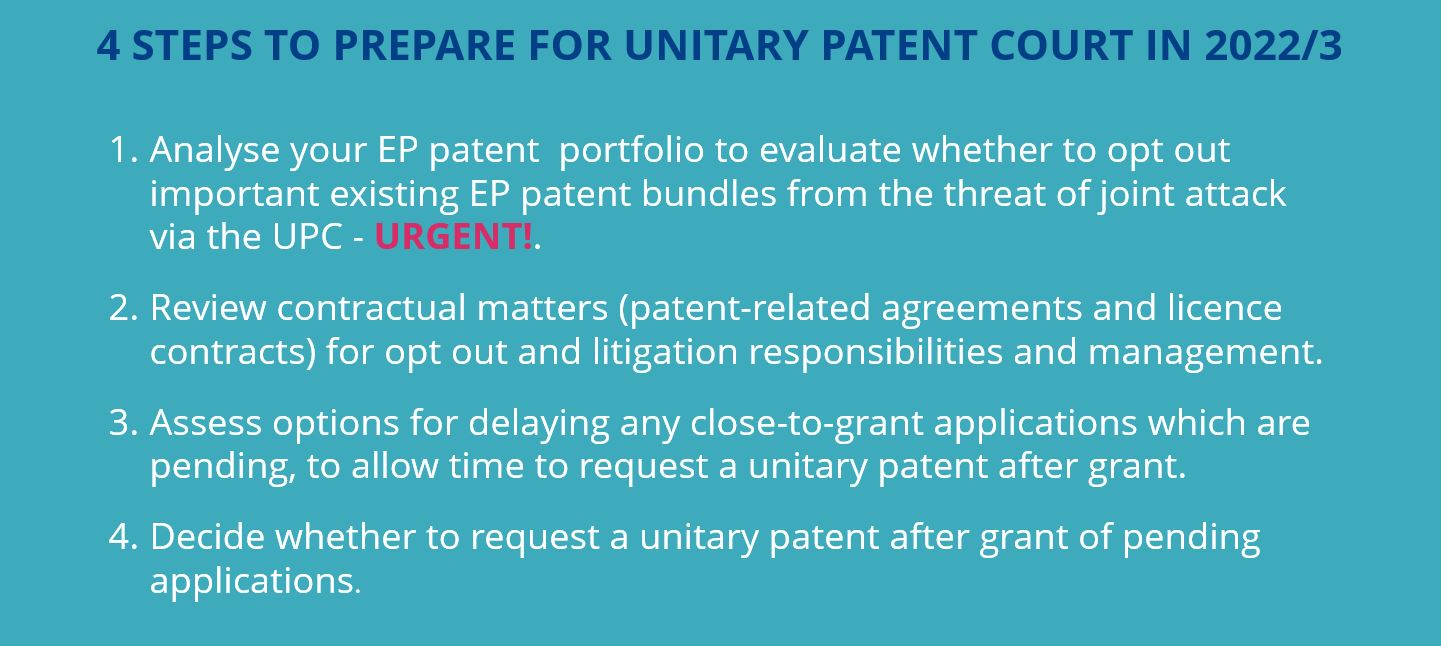Thu 16th Dec 2021
4 key steps to prepare for arrival of the Unified Patent Court and the Unitary Patent in 2022/3
Services: Applying for a patent overseas, Board support and consultancy, International reach, IP audit, IP licensing, IP litigation and disputes, IP portfolio management, IP strategy, Obtaining a patent, Opposing and defending a patent at the EPO, Patent application drafting and filing, Patents
Sectors: AI and data science, Chemistry, Cleantech and renewables, Electronics and telecoms, Food and drink, Life sciences and health, Materials science, Mechanical engineering, Software patents
Top of the IP strategy agenda for any patent owners in 2022 should be the Unified Patent Court (UPC) and the unitary patent (UP), according to Olaf Ungerer, a German and European Patent Attorney in Munich.
Since developments in Autumn 2021, both the UPC and the UP are likely to become reality between mid-2022 and early 2023.
After the introduction of the Unified Patent Court, all European patents must be litigated in the UPC for member states of the UPC, unless the patent owner opts out of the UPC.
A so-called ‘sunrise period’ will provide a three-month window before the UPC becomes fully operational. During this period, owners of existing EP patents granted by the EPO, which have been validated in one or more countries that are members of the UPC can file a free-of-charge request to opt out of the UPC.

Which countries will be members of the UPC?
At present, the joint territory of the UP is likely to cover at least 16 EU Member States, i.e. Austria (AT), Belgium (BE), Bulgaria (BG), Germany (DE), Denmark (DK), Estonia (EE), Finland (FI), France (FR), Italy (IT), Latvia (LV), Lithuania (LT), Luxemburg (LU), Malta (MT), Netherlands (NL), Portugal (PT) and Sweden (SE). A list of these countries is available here: http://dycip.com/upc-countries
Non-EU countries such as the United Kingdom (UK), Switzerland (CH), Liechtenstein (LI) and Norway (NO) will not participate in the UPC system.
Some EU countries such as Spain (ES) and Poland (PL) have indicated that they do not currently intend to participate in this system.
What is the significance of the sunrise opt out?
Opting-out in the sunrise period is important for patent owners who want to avoid the central jurisdiction of the UPC which covers all validations of existing EP bundle patents in the participating states.
By opting out, only national courts would have jurisdiction over the relevant European patent bundle, in line with the present litigation system in Europe.
Can you opt out (or in) after the sunrise period?
Opt out requests can be filed or withdrawn (‘opt in’) after the sunrise period, with the risk of a patent bundle being ‘forced out’ by a national action or ‘forced in’ by a central UPC action.
If an opt out request is not filed for an EP patent during the sunrise period and a central nullity, infringement or other action is started in the UPC against this EP patent, it is not possible to then opt out.
If an opt out request is filed for an EP patent and a national nullity, infringement or other action is started in one of the validation countries of an EP patent, it is not possible to then opt in again.
How can you obtain a unitary patent from an existing European patent application?
Furthermore, in the new UPC/UP system, a request for a unitary patent (UP) will be available after grant in addition to the traditional EP bundle patent with its individual national validations. After grant, traditional EP bundle patents serve as independent national rights in those countries where the necessary steps for validation are taken. By contrast, the UP will be a unitary IP right which can be enforced only in the entire territory covered. Likewise, the UP can only be abandoned or revoked in its entirety.
What is the benefit of a requesting a unitary patent?
Requesting a UP will have major cost benefits over traditional EP patents if, after grant of the EP application, protection is sought for a greater number of European Patent Convention states (more than about three member countries).
This cost benefit needs to be weighed against the additional costs of preparing a full translation of the granted application into English (for non-English applications) or another official EU language (for English applications) during a transitional period of up to 12 years.
There will also be possible risks arising from the exposure of valuable IP rights to a new court system, which is operating for the first time as a court in the UPC under rules of procedure newly drafted for the UPC.
How to prepare
We suggest the following preparatory measures:
- Analyze your EP patent portfolio to evaluate whether to opt out important existing EP patent bundles from the threat of joint attack via the UPC. This review is urgent since the sunrise period may start to run as early as mid-2022! Criteria for opting out existing patents can be based on product coverage, strength, importance, scope of protection, and validity.
- Review contractual matters, such as patent-related agreements and licence contracts with respect to opt out and litigation responsibilities and management.
- Assess options for delaying any close-to-grant applications which are pending (e.g., response to 71(3) communication) to allow time to request a unitary patent (UP) after grant.
- Decide whether to request a unitary patent (UP) after grant of pending applications.

Key points about the UPC/UP and opt out
Important changes under the new system include the following:
- A unitary patent must be litigated in the UPC.
- All European patents must be litigated in the UPC for member states of the UPC, unless the patent owner opts out of the UPC.
- A validly filed opt out request is effective for the life of the patent.
- The opt out request will be available from the beginning of the sunrise period and also after the sunrise period.
- If proceedings are commenced in the UPC before an opt out request is filed, the patent owner is restricted to the jurisdiction of the UPC.
- The UP and UPC do not impact the EPO Opposition and Appeal procedures.
How we can help
Both our UK and Germany based European Patent Attorneys will be able to obtain unitary patents at the European Patent Office, exactly as we do for European patents. We will also be able to prepare and file opt out requests.
This briefing is for general information purposes only and should not be used as a substitute for legal advice relating to your particular circumstances. We can discuss specific issues and facts on an individual basis. Please note that the law may have changed since the day this was first published in December 2021.
Author

